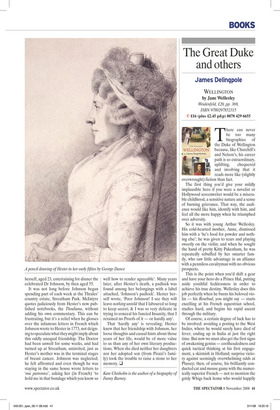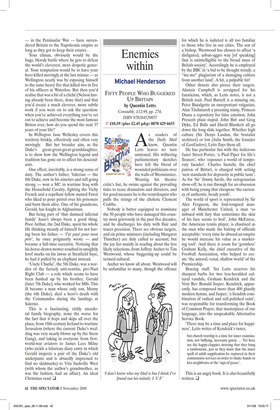The Great Duke and others
James Delingpole
WELLINGTON by Jane Wellesley Weidenfeld, £20, pp. 369, ISBN 9780297852315 ✆ £16 (plus £2.45 p&p) 0870 429 6655 There can never be too many biographies of the Duke of Wellington because, like Churchill’s and Nelson’s, his career path is so extraordinary, uplifting, chequered and involving that it reads more like (slightly overwrought) fiction than fact.
The first thing you’d give your mildly implausible hero if you were a novelist or Hollywood screenwriter would be a miserable childhood, a sensitive nature and a sense of burning grievance. That way, the audience would like him, identify with him, and feel all the more happy when he triumphed over adversity.
So it was with young Arthur Wellesley. His cold-hearted mother, Anne, dismissed him with a ‘he’s food for powder and nothing else’; he was given to tears and playing sweetly on the violin; and when he sought the hand of pretty Kitty Pakenham, he was repeatedly rebuffed by her smarter family, who saw little advantage in an alliance with a penniless cavalryman with no obvious prospects.
This is the point when you’d shift a gear and have your hero do a Prince Hal, putting aside youthful fecklessness in order to achieve his true destiny. Wellesley does this job perfectly when he burns his beloved violin — his Rosebud, you might say — starts excelling at his French equestrian school, studies hard, and begins his rapid ascent through the military.
Of course, a certain degree of luck has to be involved: avoiding a posting to the West Indies, where he would surely have died of fever; ending up in India at just the right time. But now we must also get the first signs of awakening genius — coolheadedness and quick tactical thinking at his first engagement, a skirmish in Holland; surprise victory against seemingly overwhelming odds at Plassey; then, of course, his brilliantly conducted cat and mouse game with the numerically superior French — not to mention the grisly Whigs back home who would happily — in the Peninsular War — have surrendered Britain to the Napoleonic empire so long as they got to keep their estates .
Your climax, obviously would be the huge, bloody battle where he gets to defeat the world’s cleverest, most despotic general. Your temptation would be to have your hero killed movingly at the last minute — as Wellington nearly was by exposing himself to the same heavy fire that killed two in five of his officers at Waterloo. But then you’d realise that was a bit of a cliché (Nelson having already been there, done that) and that you’d create a much cleverer, more subtle work if you went on to ask the question: when you’ve achieved everything you’ve set out to achieve and become the most famous Briton ever, how do you spend the next 37 years of your life?
In Wellington Jane Wellesley covers this territory briskly, effectively and often very movingly. But her broader aim, as the Duke’s great-great-great-granddaughter, is to show how the Wellington legend and tradition has gone on to affect his descendants.
One effect, inevitably, is a strong sense of duty. The author’s father, Valerian — the 8th Duke, now in his nineties and still going strong — won a MC in wartime Iraq with the Household Cavalry, fighting the Vichy French and a repellant fellow named Fawzi who liked to pour petrol over his prisoners and burn them alive. One of his grandsons, Gerald, has fought in Afghanistan.
But being part of ‘that damned infernal family’ hasn’t always been a good thing. Poor Arthur, the 2nd Duke, spent his whole life thinking meanly of himself for not having been his father — ‘J’ai payé pour mon père’, he once poignantly wrote — and became a full-time eccentric. Noticing that his horse-drawn mower resulted in unsightly hoof marks on his lawns at Stratfield Saye, he had it pulled by an elephant instead.
‘Uncle Charlie’, the 5th Duke, was a warden of the fiercely anti-semitic, pro-Nazi Right Club — a role which seems to have been hushed up by his brother, Gerald (later 7th Duke), who worked for MI6. This ill became a man whose only son, Morny (the 6th Duke), died a hero’s death with the Commandos during the landings at Salerno.
This is a fascinating, richly anecdotal family biography, none the worse for the fact that it hops and skips all over the place, from 18th-century Ireland to wartime Jerusalem (where the current Duke’s wedding was very nearly blown up by the Stern Gang), and taking in everyone from firstworld-war aviators to James Lees Milne (who yields a hilarious diary entry in which Gerald inspects a pair of the Duke’s old underpants and is absurdly impressed to find no skidmarks) to Vita Sackville West (with whom the author’s grandmother, as was the fashion, had an affair). An ideal Christmas read. ❑



















































































 Previous page
Previous page